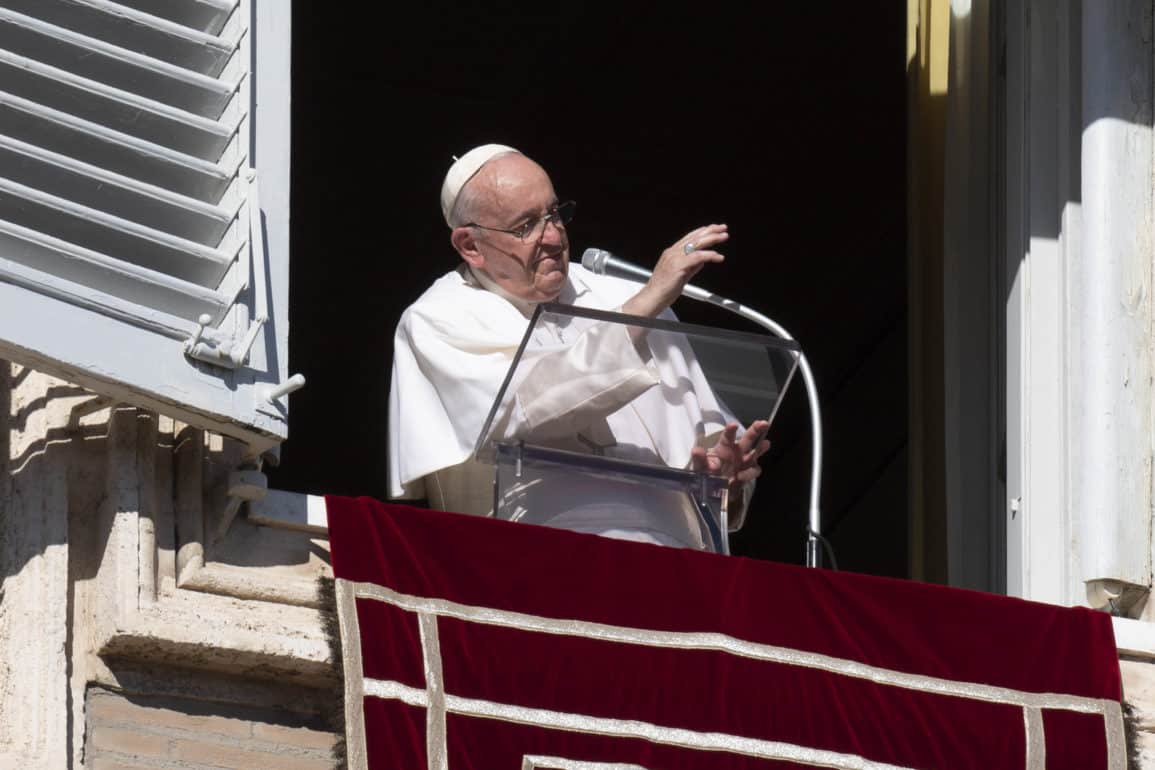At 12 noon today, the Holy Father Francis looked out of the studio window in the Vatican Apostolic Palace to recite the Angelus with the faithful and pilgrims gathered in St Peter’s Square.
Also, present were the Boys of Catholic Action of the Diocese of Rome who concluded, with the “Caravan of Peace”, the month of January traditionally dedicated by them to the theme of peace. At the end of the Angelus prayer, the boys read a message on behalf of the ACR of Rome.
These were the Pope’s words in introducing the Marian prayer:
Before the Angelus
Dear brothers and sisters, buongiorno!
In today’s liturgy, the Beatitudes according to the Gospel of Matthew are proclaimed (cf. Mt 5:1-12). The first is fundamental. This is what it says: “Blessed are the poor in spirit, for theirs is the kingdom of heaven” (v. 3).
Who are the “poor in spirit”? They are the ones who know they cannot rely on themselves, that they are not self-sufficient, and they live as “beggars before God”. They feel their need for God and recognize every good that comes from him as a gift, as a grace. Those who are poor in spirit treasure what they receive. Therefore, they desire that no gift should go to waste. Today, I would like to pause on this typical aspect of the poor in spirit: not to waste. The poor in spirit try not to waste anything. Jesus shows us the importance of not wasting. For example, after the multiplication of the loaves and the fish, he asks that the leftover food be gathered so that nothing would be wasted (cf. Jn 6:12). Not wasting allows us to appreciate the value of ourselves, of people and of things. Unfortunately, however, there is a principle that is often disregarded, above all in more affluent societies where the culture of waste, the throw-away culture is predominant. Both are a plague. So, I would like to propose to you three challenges against the waste mentality, the throw-away mentality.
The first challenge: not to waste the gift that we are. Each one of us is a good, independent of the gifts we have. Every woman, every man, is rich not only in talents, but in dignity. He or she is loved by God, is valuable, is precious. Jesus reminds us that we are blessed not for what we have, but for who we are. And when a person lets go and throws him or herself away, he or she wastes themselves. Let us struggle, with God’s help, against the temptations of believing ourselves inadequate, wrong, and to feel sorry for ourselves.
Then, the second challenge: not to waste the gifts we have. It is a fact that about one-third of total food production goes to waste in the world each year, while so many die of hunger! Nature’s resources cannot be used like this. Goods should be taken care of and shared in such a way that no one lack what is necessary. Rather than waste what we have, let us disseminate an ecology of justice and charity, of sharing!
Lastly, the third challenge: not to throw people away. The throw-away culture says, “I use you in as much as I need you. When I am not interested in you anymore, or you are in my way, I throw you out”. It is especially the weakest who are treated this way – unborn children, the elderly, the needy and the disadvantaged. But people are never to be thrown out, the disadvantaged cannot be through away! Every person is a sacred gift, each person is a unique gift, no matter what their age or condition. Let us always respect and promote life! Let’s not throw life away!
Dear brothers and sisters, let us ask ourselves a question. Above all: How do I live poverty of spirit? Do I know how to make room for God? Do I believe that he is my good, my true and great wealth? Do I believe that he loves me, or do I throw myself away in sadness, forgetting that I am a gift? And then – Am I careful not to waste? Am I responsible about how I use things, goods? Am I willing to share things with other, or am I selfish? Lastly, Do I consider the weakest as precious gifts whom God asks me to care for? Do I remember the poor, those who are deprived of what is necessary?
May Mary, the Woman of the Beatitudes, help us witness the joy that life is a gift and the beauty of making a gift of ourselves.










